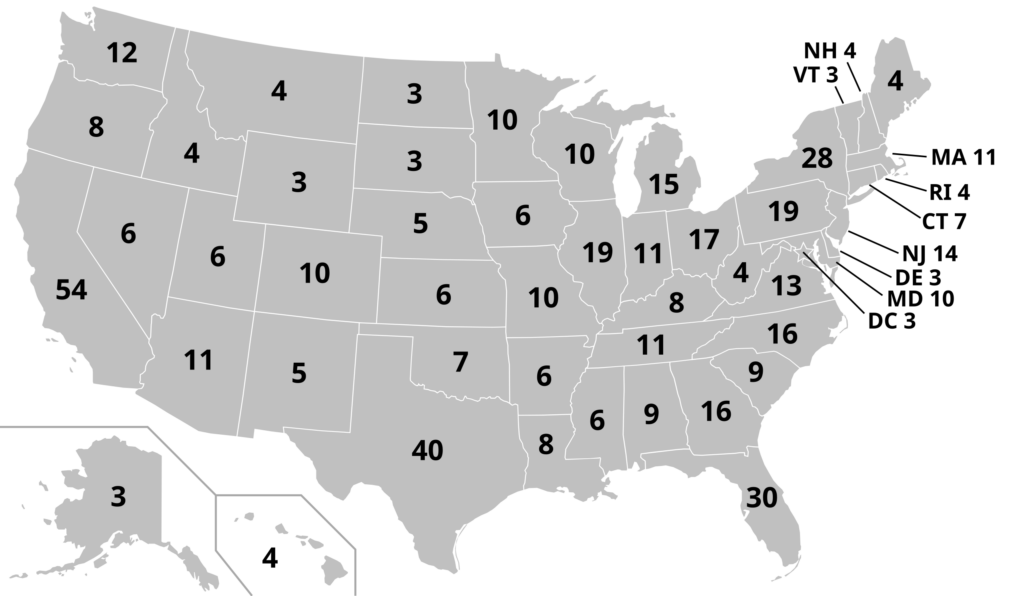The electoral college is the process by which the President of the United States is selected, and unlike in direct democracies, the popular vote is not considered in the decision of whom is inaugurated – what matters instead is the states’ vote, or votes cast by electors in the electoral college. As a result critics argue the electoral college undermines the democratic process via underrepresenting or overrepresenting certain groups of people.
Specifically, critics argue the electoral college’s skewing of the vote in favor of small states is unjust. For example, a vote cast in California will be worth considerably less than a vote cast in Alabama, which not only is unfair to the people living in California but also skews the nation’s politics in favor of Alabama’s despite the popular will being otherwise.
Critics moreover maintain instead of preventing the vote from being determined by the large states, the electoral college hands the vote over to the few in swing states, which as a result utterly undermines what the electoral college’s aim was in the fist place. For example, it is generally agreed upon that everyone’s vote should make an impact in the election; however, under the electoral college, and especially in the modern day, only the votes of a few thousand matter.
Ultimately critics argue the electoral college is dysfunctional, and I would have to agree. The electoral college either needs reform or ought to be abolished. However, if change were to come to the electoral college, how should it exactly be enacted?
A popular idea is to abolish the electoral college. Doing so would eradicate the political bias that comes with the institution and bring fairness to the voters. Not to mention, the fear of larger states dominating smaller ones without the electoral college is now outdated given how times have changed since the early days of the republic; thus there is nothing to worry about. However, although abolishing the electoral college and transforming the presidential election process into a direct vote would be an improvement, electoral college reform would regardless be favorable due to the need for an electoral college without its current flaws. Specifically, Alexander Hamilton, presumably the author of Federalist No. 68, defended the need for an electoral college with the following:
“It was desirable that the sense of the people should operate in the choice of the person to whom so important a trust was to be confided. This end will be answered by committing the right of making it, not to any pre-established body, but to men chosen by the people for the special purpose, and at the particular conjuncture… It was equally desirable, that the immediate election should be made by men most capable of analyzing the qualities adapted to the station, and acting under circumstances favorable to deliberation, and to a judicious combination of all the reasons and inducements which were proper to govern their choice. A small number of persons, selected by their fellow citizens from the general mass, will be most likely to possess the information and discernment requisite to such complicated investigations.”
Essentially, Hamilton communicated the president of the United States should be chosen by qualified individuals kept in check by the people. Such a system would in theory maximize the odds of a qualified individual with good intent taking office and prevent mob rule. Unfortunately however, directly electing said people via the modern electoral college fails to accomplish such a thing: those elected by the people to determine the president fail to properly evaluate the best contender for the role. What merely happens instead is a rough reflection of the people’s will, meaning the outcome is as if the people voted directly.
Therefore, even with fixing the electoral college’s misrepresentation of the people, the institution would nonetheless remain dysfunctional. A new system must be built from the group up to determine the president of the United States.
An endless amount of debate can be held regarding such a new system. However, it should take the following into consideration: (1) The new system should be designed to prevent mob rule or foolish decisions by the people. (2) Well educated electors should determine the president, free of backlash or repercussions from acting in good will and learned reasoning. (3) In order to serve the people, the popular will must influence the electors in some way or another. (4) The electors must be kept in check, which will presumably be predominantly done by the people. (5) The electors must routinely change to allow the nation to evolve, if they do not change every election. (6) The tyranny of the majority must be prevented. (7) The new system is to avoid misrepresenting the people in arbitrary respects as the current electoral college does. (8) Radicalism as practiced in the modern day must be prevented, and any radicalism whatsoever should be treated with extreme caution. (9) The electors are not to be loyal to any party but to the people. and (10) The electors are to respect the rule of law and the constitution. Designing a new electoral college system is a monumental task to only be done with the most careful deliberation in a large and lengthy group effort; however, in the end it will pay off.



Great read! The Electoral College is definitely a bit outdated, and the way it operates today is not really effective or fair to voters in certain states. Unfortunately making significant reform or outright abolishing it would likely take a level of congressional cooperation that is difficult to amass in todays political climate.
Make more political theory articles please.